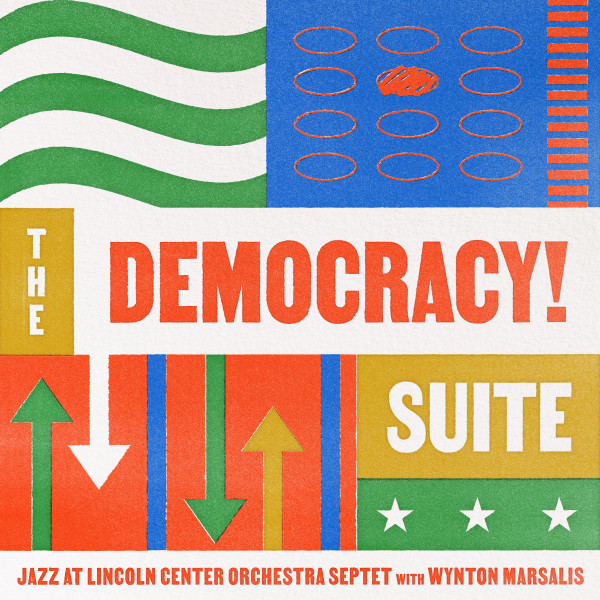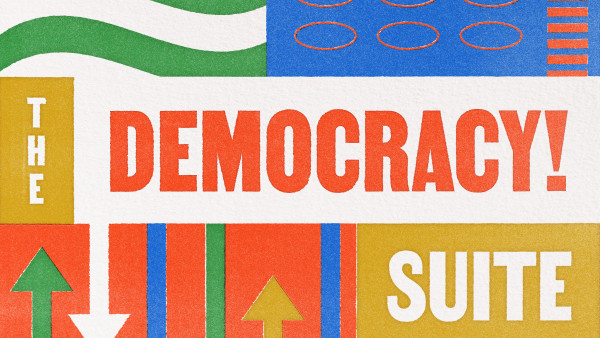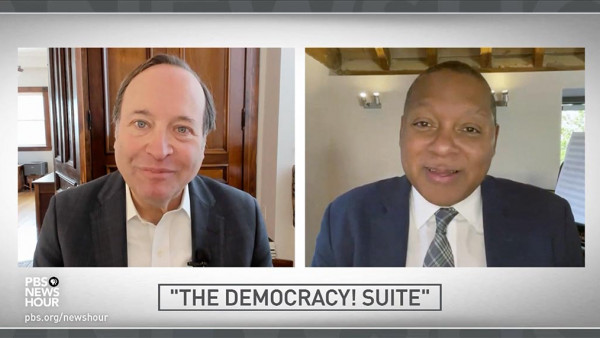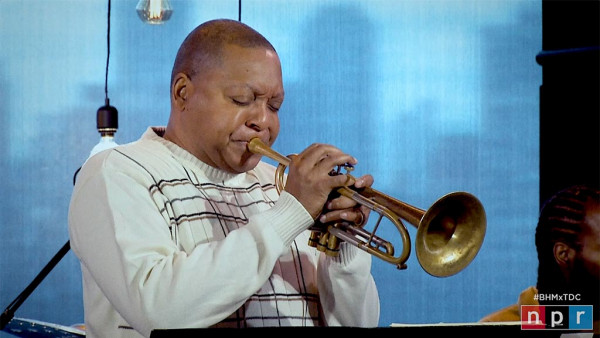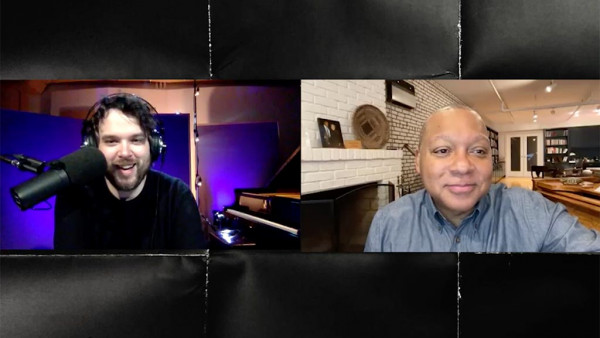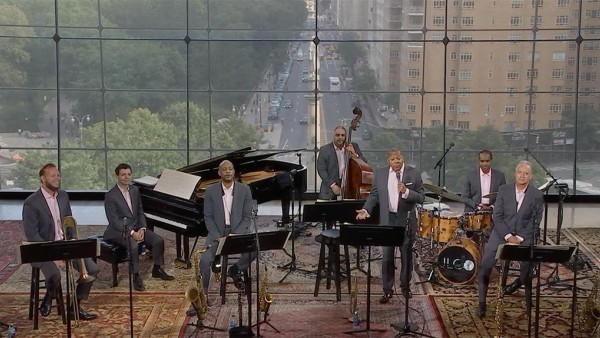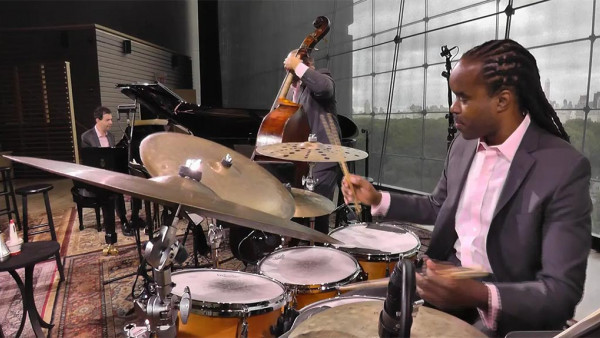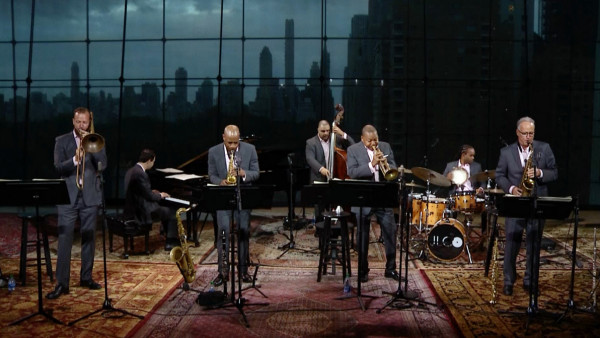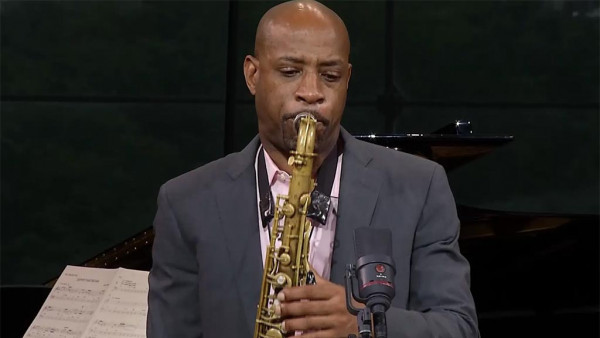Spark & Fire Podcast - Play to your elevated purpose: Wynton Marsalis on “The Democracy! Suite”
“Everything that you do in the arts is you giving meaning to your way of life.” In a year of pandemic, racial reckoning and threats to democracy, bandleader Wynton Marsalis created a seven-song cycle that imagines how artists can respond to their own time. As he talks us through “The Democracy! Suite,” he teaches unforgettable lessons about collaboration, preparation, and the costs and rewards of a creative life — lessons that can help you endure as a creative person, no matter your field.
Listen on: Apple – Spotify – Google
Chapter 1: Do you love it?
Wynton Marsalis: I was leaving home, and I’d had a contentious relationship with my mother and him. So it was time for me to go. I was 17 years old, and everybody was telling me, don’t go into music. My mama said, “Don’t go into music; you’re going to struggle like your daddy.” Don’t go into music. Don’t go into music. Don’t go into music.
So I asked my daddy, “Should I go into music, man?”
He said, “Well, man, you know, do you love it?”
I said, “Yeah, I love it.”
He said, “No, man. I mean, do you really love it? Are you willing to just do this, no matter what your struggle is?”
I said, “Yeah, man. I think I love it like that.”
He said, “Well, as long as you think you love it, don’t go into it. When you know you love it, you go into it. Because there’s nothing greater in the world to do than to do this. To make things that give people the type of joy this music gives them.” There is no higher calling.
Chapter 2: From the darkness, a spark
How do you capture a great idea? Express it creatively the moment it comes to you, wherever it comes to you, and whoever it comes from.
Wynton Marsalis: It’s a trying time, when you’re used to playing, to not play. Because there’s a lot of nourishment in that. It’s a symbiotic relationship between a musician and an audience. And if you’re a jazz musician, you have the intensity of trying to really communicate something to people that they may or may not understand. So you’re really in tune with them. And when you lose that connection, it’s very painful.
Our Vice President of Touring, Dan Israel, called me and said, “Man, we should do a piece and record it in the hall, and we’ll send it out virtually. We’ll talk to all the different presenters we know around the world.” And I thought, yeah, that’s a good idea, let me see. I’ll start writing this piece.
Once I start hearing stuff, I just hear it. I might be coming out of the shower. I wake up in the morning, I can hear it. I’m driving in the car, and they’ll come to me. And then I just sing it into my phone. I don’t even give it a name. I’ll sing one theme. Then I sing another one, then I sing another one.
I remember the one that I called “Ballot Box Bounce.” I always sing like something is chasing, something is following [singing].
So now I hear that one part, but I also hear another second part. I can’t sing the two parts at once, but I can hear them at once. So, the one is going [singing].
So the second part is chasing the first part [singing].
Now the bridge, I said, I want it to be really abstract [singing]. Then I just sing in that kind of abstract language. And then I begin to write it out. I write it down exactly like it is.
I put all the themes that I have, that I’ve sung, in the music notebook. If I have suites or pieces that are unified, I write out how I want it to be unified. But as I write them out, invariably, I will change them. And I try to make each movement be related in some way to other movements.
When I sing two or three of them, I start to get an idea of what I want to talk about. You have a lot of latitude when you’re writing music about something. Because there are no words, it’s more the emotion or the feeling of a perspective in that experience.
This was before the election. So, I remember thinking, we have a postmaster general who’s making ballot boxes bounce away. It’s almost like you have a fire chief that’s an arsonist. And the members of the fire department are saying, “Hey, this guy is telling us to set fires.” I love the fact that people who were working at the post office were exposing it. So I tried to pay attention to the underneath. That’s why the song is a bounce [singing].
I made it be peppy and upbeat. But the complexity of the situation, I put — the chord changes on that song were very difficult. So it might be a simple melody, but the harmonies move around in a way that makes you kind of uncomfortable.
It’s an unusual sound. I mean, it’s been used… But it has a kind of a … it’s a sound that is… bouncy. I don’t know how else to describe it (laughs).
Chapter 3: The art of improvisation How do you create a truly great collaboration? Share the space.
Wynton Marsalis: One of the challenges in Democracy! Suite is, we said before we played it: Let’s try to share more space when we improvise.
Now I have seen eight horn players play on one song for 45 minutes. It’s so ungracious and disrespectful to the rhythm section, because the bass player and the drummer is playing the entire time, and you know that they’re tired of hearing you play because the rhythm section does a thing that we call breathing. Like they’ll be playing [singing]. They take a big breath at the beginning of the form, like to say, “Please stop playing.”
The thing of the Democracy! Suite was: Let’s not take long extended personal solos, and share the space with each other. When I said I thought we should do that, everybody embraced it and said this is the type of time that we need to do that. We were feeling the same way in the time.
Jazz is about the sharing of agency and power. That’s, in essence, what makes it like democracy. It’s mobile. It’s always changing.
Now what happens with jazz, like with our constitution, is a very sophisticated set of checks and balances that require a great deal of manners, acuity, and desire for you to function inside of them.
You have to listen to your neighbors and make choices many times that’s for the betterment of the collective to the detriment of yourself.
Prime example is, we improvise. To improvise means you can make up the music you play. You choose the length of your improvisation, because it’s your personal right, your freedom. So that is democratic.
How you go with the moment of improvisation instead of imposing your will on everybody. When to assert, when to support. You have to assert your personality because you’re soloing and develop your solo and make it coherent, and you’re under the pressure of time, as we often are when we’re making democratic decisions.
If you don’t have agency or power, you want it. And if you do have it — if you’re not democratic-minded — you don’t want to share it.
So, in that way, it’s like a principle conception of the type of democracy we practice and why it struggles, and it is struggling in this time.
Chapter 4: Making art that matters How do you create work that will stand the test of time? Give it meaning for this specific moment.
Wynton Marsalis: It’s easy to lose meaning. And my little brother, my little brother Jason, he plays drums. He did a thing when he was seven-eight years old, he started to say, “But what does it matter?” Every time you said something, he would say, “But what does it matter?” You say, “It’s time to eat.” “But what does it matter?” “Turn the television on.” “But what does it matter?” “Did you practice?” “But what does it matter?”
You started to notice with him saying, “but what does it matter?” Yeah, you know, what does it matter? Does it matter if I call my mama ma’am? I mean, it’s very formal, no. Does it matter if I wear a suit on a bandstand? No, it doesn’t matter. Does it matter if I cuss my parents out and call them out? I mean, I’m not going to die tomorrow. No, it doesn’t matter. Does it matter if I do this work? No, it doesn’t matter. The world is not going to end because you didn’t do this.
We give it meaning by the serious way we address the integrity of it. And when we address that integrity with seriousness, we don’t want to do things that undermine our fellow citizens. We don’t sit well with cabs passing up people, something that trivial. We don’t sit well with a portion of our education system being raggedy because it’s for some Black people. We don’t sit well with our officers killing Black folks. Everything that you do in the arts is you giving meaning to your way of life. And that’s why the arts are so important because they translate human meaning across time.
I did want a song that had a familiarity to it. So the kind of… [singing]. That has that kind of feeling of those kind of freedom songs. I started to think I want a language that is reminiscent of the freedom language of the 1960s and ’70s, which I grew up in, and Ted Nash also grew up in. The kind of sound that would be something somebody could hum and use open fourth intervals, which we equate with a kind of Black consciousness movement that was used by musicians like Rahsaan Roland Kirk and Max Roach.
“Be Present” was about all the people who are present in this time. And this is a time that requires us to be present in whichever way we can be. Early in the pandemic and the George Floyd — people were asking me what did I think about Black Lives Matter? What did I think about various things? And there’s always pundits and people talking about well, we should be doing this or that. And I was saying that these problems we have are so great, it doesn’t matter what you do. Do something.
So if you are saying Black Lives Matter, great, do that. If you’re trying to make sure people get equality in schools, fantastic. If you’re just telling somebody in your house, don’t call people this name, that’s fantastic. Like all of it, be present.
Your art is you giving meaning to your way of life. Everything I think about in our way of life, our country. What we have to do to maintain our way of life, the battles we have to continue to fight for the equality of other citizens.
And that’s why the arts are so important. And that’s why they cost so much. That’s why when you hear Duke Ellington’s Afro-Bossa, that cost him. When you look at the Sistine Chapel, this cost this man to get up here and do that. When you listen to the sound of Billie Holiday, that cost her to produce that. When you read Shakespeare, it cost him. It didn’t just roll off of his pen. Oh, man, you’ve got to be for real.
Chapter 5: Recording the Democracy! Suite
How do you come back after a long absence? You better practice. And some healthy competition never hurts.
Wynton Marsalis: We hadn’t been in the House of Swing in a while. We call it, and it has been called New York City’s living room. It’s just one of those rooms. And it’s an iconic view. The window is beautiful. And you can see out onto Columbus Circle in the beginning of the park and down 59th Street, Central Park South.
Two days we rehearse. So we learn the music, and we go through it. All of us have been practicing because your chops are not up, you’re not in game shape. So, we’ve been thinking, hey, we got to play this recording. We gonna — the brass instruments, Elliot and I, we looked at each other, we’re like, “You better be practicing.”
Then we go in to record it the next day and the very first take, we’re playing with so much more intensity and volume. When we finished that first, Elliot and I were like (whistles) And Carlos said…(whistles) “It’s very different when you start to really do it.” You know.
Carlos still looks at me. He’s another musician I taught when he was a kid. So, he’s always saying — whenever I mess up, he looks up from the bass like, “Mm-hmm.” Or another thing they do if I play a wrong note at my reading, Ted, a really good reader, so sometimes he’ll say, “Was that a B flat?” So I know I played a B. I played something wrong. “Was that a B flat?”
So we thought we were ready, but we understood: This is going to be a long day. And we thought it was just gonna be a couple of hours, and we gonna get out of here, but. You look at the film of the Democracy! Suite, we started in the daytime, and when we end it’s nighttime. So it was, it was challenging.
Let me, I’ll give you an example, just playing. It’s like when you have chords that are moving like… (playing piano).
But because Ted and I will be competitive about it, I’m trying to make sure that he knows I could play these chords.
That progression was really hard. So when we had the first break after rehearsing it, I made sure I really practiced that progression. And when we came back together and started playing it, we started to laugh about who had practiced the progression.
Chapter 6: Don’t change it
Wynton Marsalis: Even on the recording of “Ballot Box Bounce,” the second bridge I played on, I didn’t really play what I wanted to play. But they always say: “Leave it. Don’t change it. That’s what you played.”
You can’t evaluate stuff when you’re playing because you know if you really mess something up, okay. But you don’t really know. A lot of times you think something sounds good and it doesn’t, and sometimes you think it’s not good, and it’s actually some of the best stuff you played.
You have to just embrace the moment keep your momentum and your positivity and focus and concentrate on what the rhythm section is playing and on where you’re trying to go in your solo. It’s difficult to think about chords when you’re playing.
So if you’re actually thinking about chords, you’re going to have trouble soloing. You don’t have the mental space to think about all of that. Think about chords, the time is going by, I’m trying to execute ideas, I’m trying to make the melody make sense, and the rhythm section is playing something. I’m interacting with them. They did something I’m not familiar with because when you play, all you hear is… [singing].
When you’re playing, you’re hearing everybody. Like it’s hard to even explain something about the intensity of playing. Because the ideas you’re formulating are music and they’re rhythms and they’re melodies, they’re not thoughts like I want to play a G or, I should be playing an F sharp. If you think that, you’re messing up because you don’t have the mental space.
Chapter 7: A rough gig
How do you have great impact in less-than-perfect conditions? Remember: You’re all in it together.
Wynton Marsalis: We said, we’re going to go on a tour and we’re going to play this music and we’re going to film it. The older of us were thinking, okay. Ted Nash and I, do we really want to get out there? We hadn’t played gigs in four or five months. I mean, most of us we’ve been playing, working since we were 12 or 13. Okay. So, yeah, we’re going to get out there.
Now, once we got out there on the road and started playing, it was a different challenge. One night we played out on Cape Cod at a drive-in; we had never played a drive-in. It was in the fall; I don’t know if it was October. It was late enough for you to think it could be warm, but it could also be very cold.
So we go to this parking lot, and then there’s a stage set up. Then you go step up on the stage, a wooden stage, and there’s mics on it. But it’s all very down-home, it’s homespun. It’s like you and cousin Eb just set up something. Something you see on old Green Acres or something like that. So we come out there, we looking around, and then all of a sudden we start sound checking, and it’s freezing cold. So everybody in the band is thinking, man, you got us out here. We’re doing this.
So I’m really thinking about Ted Nash, who’s sitting on my left, because he’s our oldest member, and he’s playing the flute, and the flute does not want to be in the cold. He’s playing a reed instrument, reed instruments don’t like the cold. So we leave that soundcheck and everybody is dejected. It’s like, boy, this is going to be a rough gig. So we’re waiting for the gig to start. We finally, we come to the gig, and I just, I can’t, I’m feeling like: “Boy, this is going to be a rough one.”
In the band, we have two or three things we say. One is, “We out here.” And “Another one like the other one.” And that’s it.
As we walked onto the stage, Ted Nash, who was our member that I was the most worried about, he looked at me and said, “Let’s go, man.” Like, well, let’s get on it. And then we started to play. All you see is cars. And there were a lot of people’s cars out there. We were playing for a radio feed that would go into their cars. And people started blowing their horns when they saw us. And like, hey, they want to do something too.
I had to make an announcement. “Don’t blow your horns, because it’s against the city ordinance” or something. People stopped blowing their horns.
And it was cold, but it was warmer than it was during the soundcheck, and we had some heaters up there. Poor Walter Blanding was freezing, and he was rubbing his legs the whole like… And Carlos is back on the bass. And he has on every kind of thing he can put on; mittens and muffins and a coat. You thought, man, this is crazy. We can’t see the people where they in their cars, we out here freezing playing.
But when we actually started doing it, and announcing songs and playing. People would turn their lights on and flick them off and on after songs. You felt it was going to be really something unnatural and uncomfortable, but it wasn’t an unnatural experience. The people loved it. They were getting out of their cars at the end, and they were just cheering. Then we knew we could do the tour; it would be okay.
We’re in this thing together. And everybody in the orchestra’s attitude is so unbelievably positive. And they are so down for the cause and the mission.
After the gig, we were all laughing and joking, and we struggled to find something to eat. And then, we went back to the hotel and made sure we had thermal underwear for the next day. Whoever didn’t have thermals, that night made them say, “Okay, I got to come out here prepared tomorrow.”
Chapter 8: The song I wrote for my father
Wynton Marsalis: I teased my daddy all the time because he is real serious. So I played with him all the time. Even the last conversation I had before he went into the hospital, he didn’t come out, I was messing with him. For some reason, I went through his whole history of gigs I had gone on;
He corrected a couple of musicians I had wrong. He said a bass player, I said it was Julius Farmer, he said that was a cat named Trees, man. And when I finished telling him that, he said, “Man, why are you taking me through all this old ass shit?” So, (laughs) you know I said, “Man, I don’t know. I’m just I’m just thinking about you know all the gigs and stuff you know stuff that happened.” He said, “Yeah, yeah. Okay.”
I told him I had finished reading the Frederick Douglass book he was reading. I said, “You want me to tell you about the end of the book?” He said, “No, man. Here you go with that.” (laughs) So I didn’t tell him. So maybe he knows how all the books end now, but he didn’t know how that one ended.
He passed away a couple of months before I started work on Democracy! Suite. I don’t know the exact date when my father passed away. Like I don’t, I didn’t commit it to memory. I don’t even think about it in that way. It may seem callous, but that wasn’t… his philosophy was a lot more Eastern. I’m here, and I’m gone, man. Just don’t have…just don’t bury me in the church; that’s the one thing I don’t want. That was his one request. (laughs) Don’t do that. I’m here, and I’m gone. So, you know, in the spring sometime.
I got one song called “Deeper Than Dreams.” It’s just about, I never had, like, a kind of grief of, where I cried a lot about, it’s not like when my mama died, it hit me, but I just couldn’t sleep at night. So, I wrote a song called “Deeper Than Dreams.”
My dad, he meant a lot to me. And a lot of musicians he taught, he meant a lot to. He invested a lot in a lot of different people, not just his sons, and he loved them. He would talk about their music, be proud of their achievements. And he would mention those that were not the best musicians. He was not a small person.
You know that’s… That’s the thing about the old man, he was just, yeah I don’t know, he was for real. You know there’s no way to really capture the essence of the man and just the kind of the integrity he had about stuff and all of the lessons he taught me.
I have a four-decade journey with these issues. Issues of freedom and rights and of slavery. And not just in the Afro-American sense, in a human sense. The point is how to achieve a world in which everybody can have it the best.
Everything that I write or do is something of the ambitions of my father and the things he wanted to see happen.
Source: Spark & Fire Podcast

